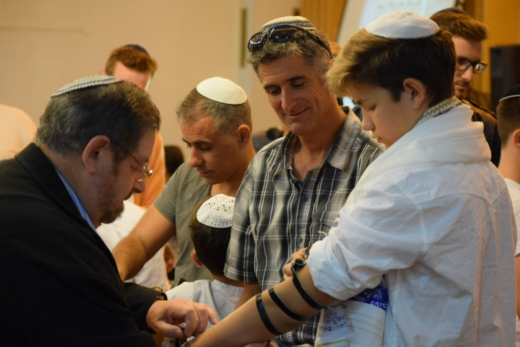
JERUSALEM (Press Release) — Sixty deaf and hearing impaired young adults from all over Israel participated in the annual Bar/Bat Mitzvah celebration ceremony organized by the International Young Israel Movement (IYIM) on May 7 in the Beit Yaakov Synagogue in Jerusalem.
This event was held in cooperation with Acha (The Association of the Deaf in Israel) and Shema (non-profit organization dedicated to the advancement of children with hearing loss and to their integration into society).
This year’s program was named in loving memory of the recently deceased Ceec Harrishburg z”l, the founding President of IYIM. His wife, Tema, along with his children, grandchildren and many friends, were in attendance.
Upon arrival, the participants and their families were entertained by Gustavo the Magician as buses arrived from the North, South and central regions of Israel. Then, celebrants went into the Beit Midrash of the synagogue for their final preparatory shiur before the ceremony, while their families, teachers, and madrichot settled into the main sanctuary.
The B’nei Mitzvah ceremony began with opening words given by Daniel (Mush) Meyer (Executive Director, IYIM), Orit Schreiber (National Programs Director, Shema) and Etty Schwartzberg (Director, Acha). Followed by gifting the celebrants with Siddurim, Tefillin bags, and candle sticks to the boys and girls, respectively.
Then it was time for the ceremony to start – the Sefer Torah was taken to the bimah while the young men put on Tefillin and were called up in two groups to recite the brachot. Meanwhile, the young ladies were given a short explanation on the importance of bat mitzvah and were also called up to reaffirm their faith. Spontaneous dancing and singing proceeded.
The ceremony was followed by a lavish celebratory lunch and continued with a tiyul exploring the Old City of Jerusalem and ending at the Kotel HaMaaravi. Sign language interpretation was provided on the trip.
“The positive feedback we have received from many parents, the smiles and thank you of the young adults makes the many months of preparation and hard work well worthwhile. The Deaf are an underserved population who are crying out for Jewish educational and social programs. We at IYIM together with our partners are attempting to give them the maximum.” stated Daniel M. Meyer (Exec.-Director, IYIM).
The feedback received was heartwarming and left an everlasting impression on celebrants and organizers alike:
“Thank you so much for an amazing day and unforgettable experience!!
You made us feel belong and let us socialise and feel alive!!
Thank you for Gustavo that made magic
Thank you for a delicious lunch and such beautiful tables with cakes and treats
Thank you for an amazing ceremony in the synagogue (I had to wipe away a few tears!)
Thank you for the tour to the Old City with guides and visit to the Western Wall
Thank you for the beautiful present
Thank you for such an incredible, wonderful, amazing day!
Thank you thank you a million times!!” (Hanna Gottfeld, parent of BM participant)
*
Preceding provided by the International Young Israel Movement
Please do not use the inappropriate term – hearing impaired (or impairment). If I tell people that I am hearing impaired, they think something is wrong with me. However, if I tell people I am deaf, they say nothing is wrong with me except that I can’t hear!
Those two terms are not interchangeable. Many deaf people who consider themselves to be just communicating through a different language (American Sign Language) can feel insulted when they’re identified as “impaired.”
We are not disabled or impaired, we are a linguistic minority.
Please remove this “hearing impaired” – thanks.
You have not signed this letter with your real name, so we are not sure whether this is your opinion or represents a consensus in the deaf community. We believe the author of this article was attempting to differentiate between a person who is deaf, and one who has partial hearing. What nomenclature would you suggest for the latter if not “hearing impaired”? Thank you for your input.